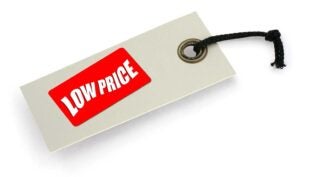
I missed the irony on my first read of the email in which a marketing firm talked about pricing. The second reading left me laughing. It never ceases to amaze me how alluring low prices are to sellers.
a
Background
A friend forwarded an email from a marketing firm. In the email the marketing firm offered examples of how Pottery Barn was able to get prices four to eight times higher than Walmart. The email went onto describe the risks of setting prices too low.
In a postscript to the message the marketing firm asked whether or not the reader was short-changing himself by charging a low price. The postscript went on to tout the firm’s online pricing course. The final line read:
Click here to receive your 50% off.
After having just warned the reader of the dangers of low prices, this firm offers a 50% off deal. Incredible!
Low Price Allure
What is it about low prices that cause us, as sellers, to fall victim to their seemingly hypnotic nature?
Frankly, I don’t know that I have the answer to this question. There are some possibilities that come to mind:
- Conditioning
- Self-fulfilling prophecy
- Laziness
Conditioning
Over the years we have been conditioned to believe that buyers only care about price. Factors that have influenced that belief are Walmart’s success with a low price strategy, the offshoring of jobs to less expensive labor markets and more than two decades of focus on cost control vis-a-vis lean manufacturing, six sigma and other productivity enhancement tools.
Unfortunately our focus on these factors has caused us to ignore the fact that many companies like Panera Bread and Kraft have repeatedly raised prices and seen revenue growth greater than their price increases during the worst recession in 70 years. Apple has also commanded premium prices during the same time interval.
In essence, our choice of focus has created the conditioning we’re living today. It has become our self-fulfilling prophecy.
Self-fulfilling prophecy
Social psychologists’ studies show that negative outcomes produce longer-lasting memories than favorable outcomes. Why? Because they trigger an emotional response.
I’m sure that you’ve had this experience. You’re in the grocery store, you’re in a hurry. You choose the line that seems to be moving the most quickly and, voila, just as you’ve unloaded your cart, the checker calls for a price check, the printer runs out of paper or the person directly ahead of you is a good friend of the checker and they embark on a lengthy visit.
Regardless of the reason for the delay, your memory is that you always choose the wrong lane. Studies have shown that this isn’t true and, statistically, it’s virtually impossible, yet that’s what we believe. The reality is that when we enter a lane and move through it at a rate that meets our needs, we don’t remember the event because our expectations were met. There’s no reason to remember the event. There’s no emotional reaction.
It’s the power of emotions triggered by failed expectations that cause us to believe that we always choose the wrong lane. Thus this belief becomes a self-fulfilling prophecy which conditions us further.
Laziness
The third possible explanation is that we’re just lazy. Lowering prices is easy. We don’t want to and don’t have to give it a great deal of thought. We just have to be slightly lower than our competitors to be ‘competitive.’
Conversely, coming up with marketing messages that convey the value, sales scripts to quantify value and offering bundles to meet various budget options require work. Work that many feel ill-equipped or ill-inclined to do. Consequently, we do as the marketing firm cited above did; we offer a discount.
Unfortunately, that wasn’t the only mistake this firm made. They failed to proofread their marketing message for congruency.
Congruency
How is it that a company that specializes in marketing can:
- Create marketing messages that lack congruency with the value proposition?
- Provide sage advice about pricing, then fail to follow its own advice?
- Expect to attract customers when sending conflicting messages?
In their defense, I see this lack of congruency in all communications. Recently I was speaking to the head of mergers and acquisitions at a Fortune 500 company and I outlined how my services could assist them in their activities. I also mentioned that I was approaching private equity firms with the same offering. Here was his response:
Over the years we’ve done a lot of acquisitions and we’ve developed a team of professionals that do a fabulous job of evaluating the pricing potential of our new acquisitions. I can see how private equity firms could use your services, but I think we have it covered. In fact, a lot of our people go into private equity when they leave here.
Excuse me, what did they lose when they left your company? If they were so adept to begin with, how did they manage to lose everything they knew in the transition to private equity?
By the way, a few weeks earlier, this same individual told a friend of mine that his group had embarked upon a divestiture program to rid themselves of companies that had a large OEM customer base. Hmmm, how did that happen when they were so adept at evaluating price potential of their acquisitions?
Takeaways
What are the takeaways for you in these examples?
- The next time you feel inclined to lower your prices, offer a discount or concede terms to a prospective customer, ask yourself, “Am I caving because I’ve been conditioned to do so, because low prices have become a self-fulfilling prophecy or am I just being lazy?”
- When creating marketing messages, for any medium, edit it for congruency. If you’re not supporting your claims with pricing that reflects the value you just claimed, then rewrite it until you get that congruency.
The few seconds these two steps take can make a huge difference, not only in your company’s profitability, but your ability to find new ways to serve your customers.
Originally posted at PricingForProfitBook.com
Published: March 14, 2014
2496 Views
2496 Views












